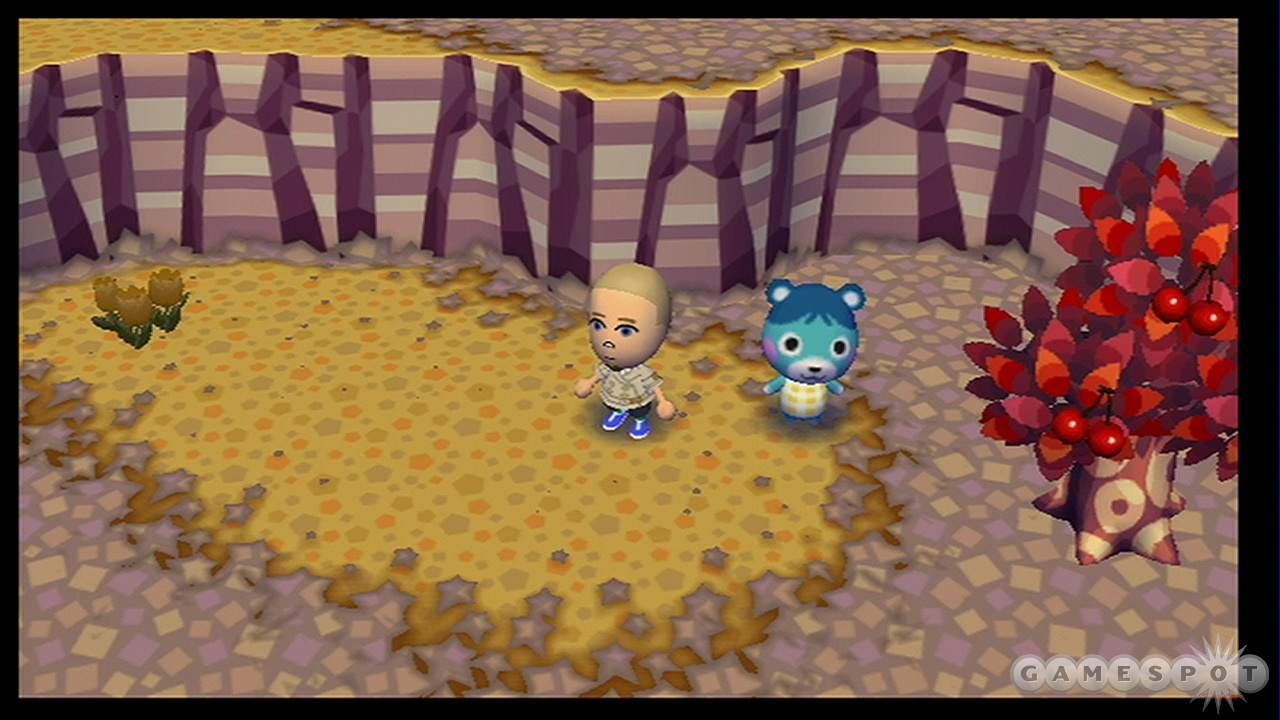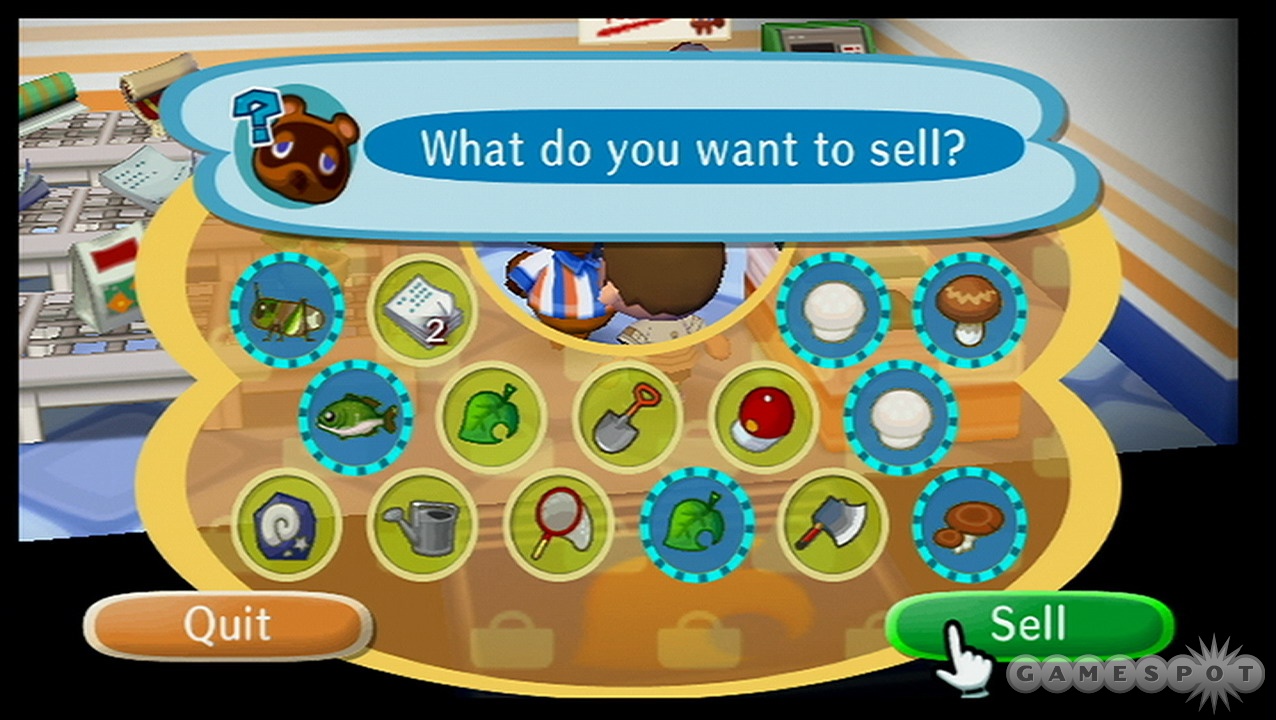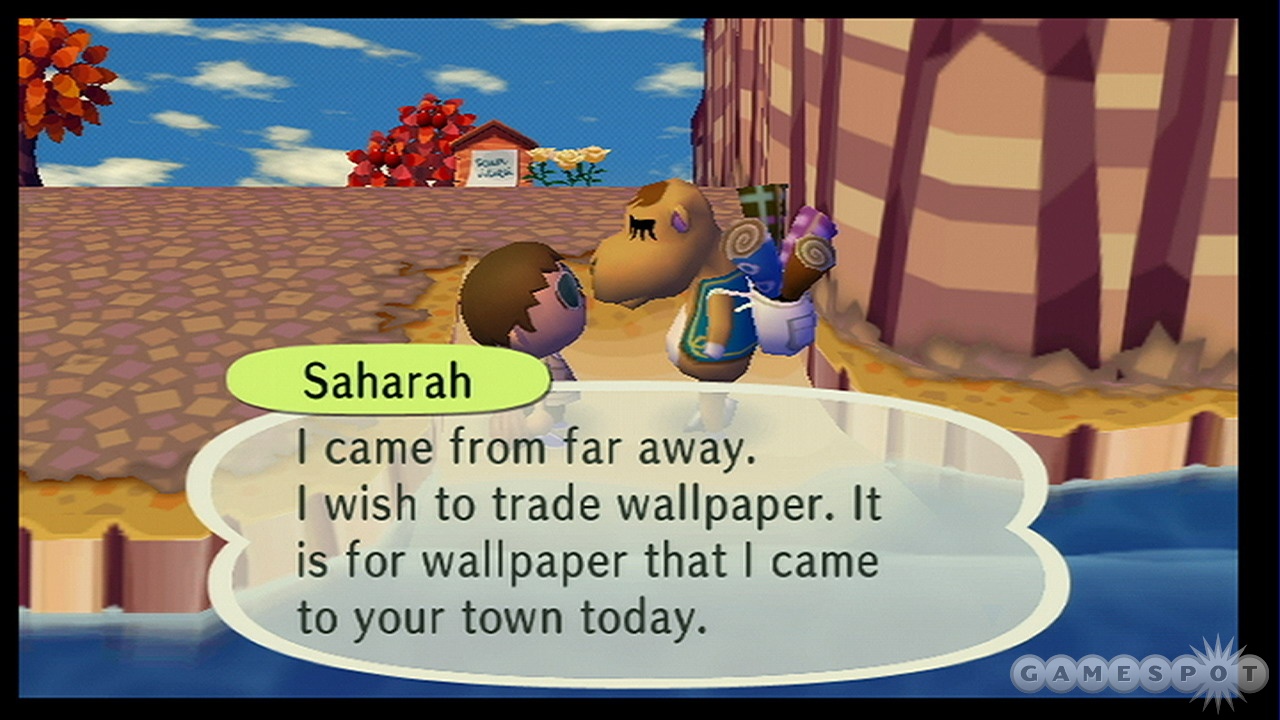Depending on where you live, Animal Crossing for the GameCube first made paying off mortgages fun sometime between December 2001 and September 2004. Actually, it was the fishing, the fruit picking, the shopping, the customization, the item collection, and the socializing that was fun, but paying off the local money lender in order to upgrade your home was one of very few clearly defined goals in the game. Later, Animal Crossing: Wild World for the Nintendo DS added a number of new features to its predecessor's winning formula, and the handheld proved to be a great platform for the game, given that it's best played for only an hour or so each day. In City Folk for the Wii, you have an opportunity to start a new life in Animal Crossing all over again, but the new features on offer aren't significant or exciting enough that you should head back down to the bottom of the property ladder if you've already climbed it.

Before getting on the bus to Animal Crossing, you have the option to import save data from Wild World, though it's only your character's appearance and the contents of the local store's catalog that get to make the road trip with you. This makes sense, given that importing a completed museum collection or a large house full of tastefully coordinated furniture would leave you with little to do in your new town. Nevertheless, there's no escaping the fact that achieving these goals a second (or even a third) time on the Wii really doesn't feel any different than it did on the GameCube or the DS. So, regardless of whether or not you're a Wild World veteran, you'll be starting out with a tiny home and owing money to Tom Nook, who, every time you pay him off, insists on remodeling your house to make it bigger and to keep you in his debt.
Fortunately, Nook is also the owner of the local store, and he'll buy anything that you wander in there with for a decent sum. Without first needing to purchase any equipment, you can gather fruit, seashells, and one of City Folk's new features: mushrooms. You'll have to make frequent trips back to the store because, as in previous games, your pockets can hold only 15 items. That's a pathetically small number considering that you spend the majority of your time picking things up, and it gets only worse as you purchase a fishing rod, a shovel, a butterfly net, and other pieces of equipment that take up valuable space. Of course, you don't have to carry all of these around with you, but there's nothing worse than seeing a rare insect that you need for one of your museum's exhibits and then realizing that you left your net at home.
When you're not busy accumulating money to pay off and purchase furniture for your home, one of the more satisfying activities that you can engage in is finding items for the town museum's insect, fish, fossil, and art exhibits. It's also one that, unless you cheat by messing with your console's internal calendar, is likely to take you the best part of a year to complete. That's because many of the insects and fish are seasonal creatures that will show up only when the weather and the time of day suits them. To catch them, you equip the net or the rod and then use the A button to swing or to cast and reel in, respectively. Insects will try to escape if they spot you, and fish will often play with your bait a few times before actually taking it, but the challenge generally comes from finding them rather than from catching them. Predictably, there's an option to move the Wii Remote in a way that imitates the use of a net or fishing rod if you prefer that to using the A button, but the latter is far more reliable. Similarly, it's possible to play the game using only the Wii Remote, but movement is a lot easier with the Nunchuk's analog stick than it is when using the remote as a pointer.

As you walk around Animal Crossing, you'll inevitably encounter some of your anthropomorphic neighbors. In keeping with the randomized layout of your town, these furry folk are randomly selected from a large pool of animal characters so as to ensure that no two players' experiences are the same. Your interactions with them typically take the form of humorous conversations that, on occasion, will culminate with you being asked to run an errand for them in exchange for a piece of furniture. Many of these errands are simple delivery jobs that can be completed quickly, whereas others seem designed specifically to keep you coming back to the game every day. For example, you might be asked to purchase a specific item that, because the stores' stocks change daily, might not be available for weeks or even months. The townsfolk are a friendly bunch for the most part, and you're encouraged to write them letters and send them gifts in the hope that they'll respond in kind. Clearly they have no idea what the contents of your letters are, but they're prone to gossiping when other players visit your town or when they move away, so you definitely shouldn't think of them as characters to confide in or share secrets with.
Taking Animal Crossing: City Folk online so that you and your friends can visit each other's towns is fun for a while; you'll find fruits that don't grow in your town that can be planted upon your return, you'll find different items for sale in the stores, you'll almost certainly get to meet a very different cast of characters, and you can chat with your friend using the optional Wii Speak microphone the whole time. Furthermore, the cross-pollination that occurs as a result lasts a lot longer than the duration of your visit, so don't be surprised if, days later, one of your neighbors strikes up a conversation about your now-mutual friend. Details like this rarely fail to raise a smile, though it might turn to a frown if said neighbor likes that friend so much that it decides to leave your town for theirs. You won't always get advance notice that someone is planning to leave, either, and it's hard not to feel some disappointment when you pop into residents' houses to pay them a visit and see that all of their belongings are packed into boxes.
Retail therapy can work wonders when you're feeling down, and though Tom Nook's store is certainly worth visiting every day to check out his new stock, the city introduced in City Folk is where you really want to be when you're in a spending mood. Just a short bus ride from your town, the city feels quite different, not only because there aren't any fruit trees or rivers in sight, but also because it's hard to walk for more than a few paces without bumping into a new character. Unfortunately, this is as much a result of the city's diminutive size as it is of the constantly changing cast of animals going about their business. On any given day, you can exhaust all of the options available to you in the city in significantly less than an hour, and that includes the time it takes to get a shoeshine and a new haircut or a Mii makeover. In addition to a couple of stores offering items quite different than anything that Nook ever gets in, the city boasts a theater in which you can learn emotes for use in conversations by watching short performances, and an online auction house in which you can buy and sell items. On paper, the auction house is one of the more exciting new features, but in practice its functionality is extremely limited; only players on your friends list can buy from or sell to you, you can bid on only one item at a time, and like so many of the points of interest in the game, it's available only at certain times.

The fact that the Animal Crossing games use the real date and time to determine what's going on in the game is undoubtedly one of the series' most interesting features. After all, there aren't many games in which time passes even when you're not playing. Unfortunately, this feature can also cause frustration; when the stores close, you can't sell anything and so your progress comes to a grinding halt. Fishing tournaments are held only on Saturdays, you can only buy turnips with which to dabble on the stock exchange on Sundays, and you could conceivably go an entire year without meeting some of the more interesting traders and performers who pass through your town if you don't happen to be playing when they visit. You can celebrate holidays in City Folk if you're playing at the right time, but these are known by generic names and don't always run for the entire day. For example, Thanksgiving is referred to as Harvest Festival and is celebrated with a party at the town square at 3pm, and there's no mention of Christmas even though there's a character who gives out presents on December 24.
Animal Crossing: City Folk looks, sounds, and plays a little too much like its predecessor on the DS to be worthwhile if you already own that game. The visuals are cute and colorful, but dated. The cheery audio isn't as impressive on the Wii in 2008 as it was on the DS in 2005. Furthermore, the gameplay is largely unchanged and, unless you're at home with your Wii at all times of the day, it's better suited to the DS. With all of that said, City Folk is every bit as engaging and entertaining as its predecessors and so, if you managed to miss out on those and have an hour or so to spare every day for the next year, you'd do well to move in.



